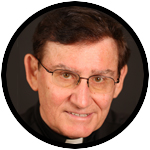
Father Eugene Hemrick
Listening to shouting protesters at the Supreme Court and U.S. Capitol during the hearings for Judge Brett M. Kavanaugh got me wondering what Father Romano Guardini would say about the unsettling events we are experiencing.
In 1951, he wrote the book “Power and Responsibility,” in which he envisioned such experiences. To maintain balance in the midst of mindlessness, he called for the age of the “ascetic man.”
He starts by pointing us to ourselves and first recognizing the wrongs within ourselves and setting about righting them.
He then goes on to spell out the role of the ascetic man.
“He must regulate his physical as well as his intellectual appetites and educate himself to hold his possessions in freedom, sacrificing the lesser for the greater. He must fight for inner health and freedom — against the machinations of advertising, the flood of loud sensationalism, against noise in all its forms.
[hotblock]
“He must acquire a certain distance from things; must train himself to think independently, to resist what ‘they’ say. Street, traffic, newspaper, radio, screen and television all present problems of self-discipline, indeed of the most elementary self-defense — problems we hardly suspect, to say nothing of tackling.
“Everywhere, man is capitulating to the forces of barbarism. Asceticism is the refusal to capitulate.”
Finally, Father Guardini states the end result of asceticism is to hold “life high in honor so that it may be fruitful on the level of its deepest significance.”
At the moment, we are experiencing an age of craziness and the unthinkable. No doubt some would object to Father Guardini calling our age barbarous, arguing this is democracy at its best with people airing their sentiments on what is right for our country.
But are those who protest ultimately guided by an inner health and freedom founded on asceticism? Do they reflect the discipline, time and sweat it takes to study and think through their convictions at the deepest level possible?
Asceticism requires the discipline of contemplation and fighting against noisy, useless distractions to judge prudently. If this asceticism were employed, I believe we would experience a “higher life of honor” and fruitfulness.
PREVIOUS: Romero’s growth in holiness, fearlessness, led to sainthood
NEXT: Blesseds Romero, Paul VI’s courage sets example for us


The basis for asceticism is to cast all of our care on the Lord and being anxious for nothing (see 1Peter 5:5-7 and Philippians 4:6-7). This gives us the peace and strength to deal with our human weakness and to do the right things.
Peter speaks of “having escaped the corruption that is in the world through lust” (2Peter1:4). Lust is what keeps us inordinately attached to anything. Unconditional trust in God, which is the opposite of lust, brings us the peace and strength to counteract this lust.